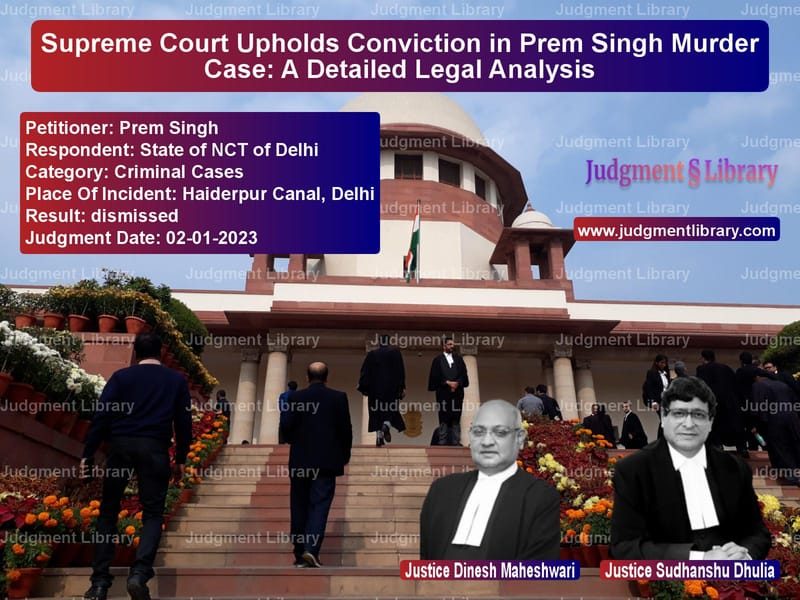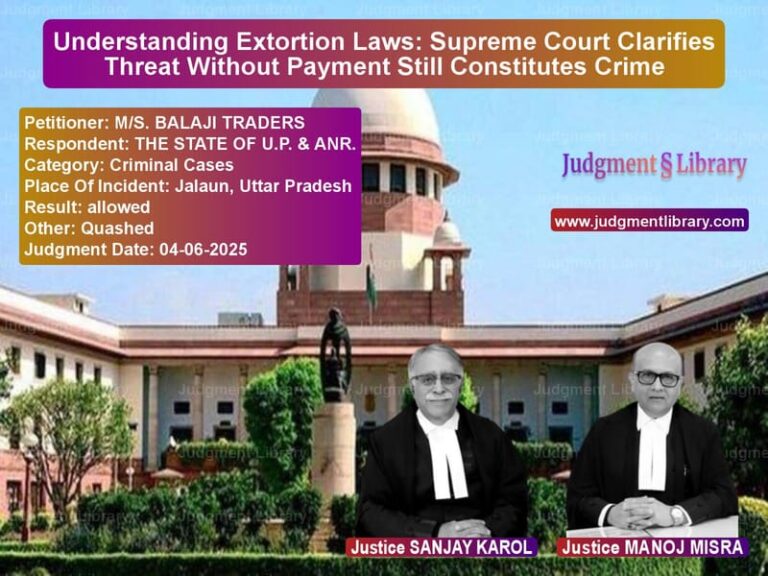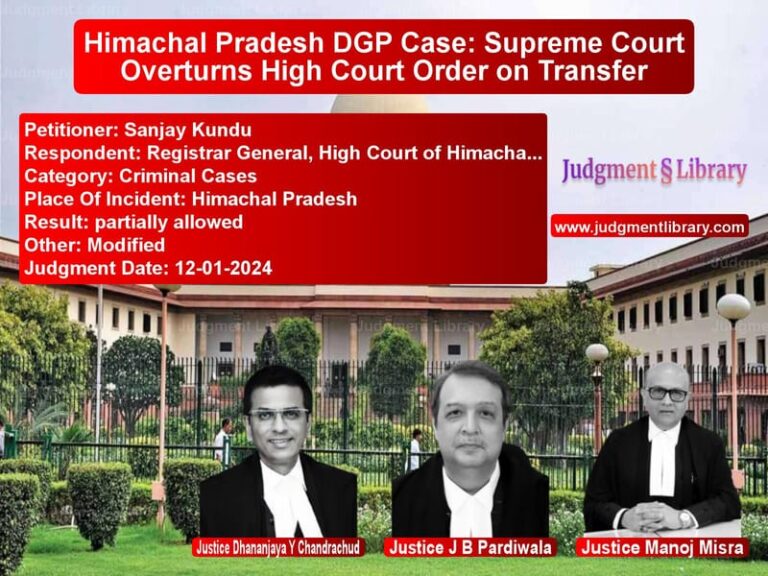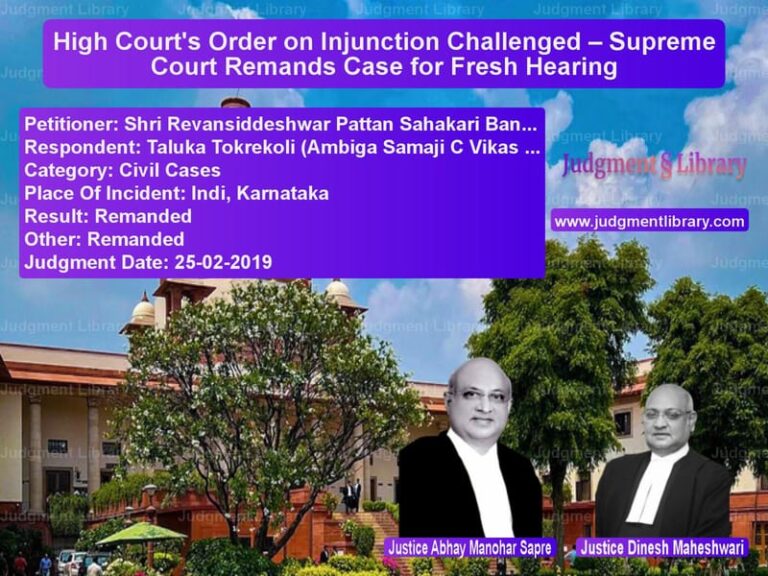Supreme Court Upholds Conviction in Prem Singh Murder Case: A Detailed Legal Analysis
The case of Prem Singh v. State of NCT of Delhi is a chilling instance of brutal murder where the accused, Prem Singh, was convicted for killing his two sons by throwing them into a canal. The Supreme Court upheld the conviction, emphasizing the evidentiary value of circumstantial evidence and rejecting the plea of mental incapacity raised by the defense.
Background of the Case
Prem Singh, a resident of Delhi, was charged with the murder of his two minor sons, aged six and four. The prosecution alleged that on the fateful night, he took the children near the Haiderpur Canal and deliberately threw them into the deep waters, leading to their drowning. The motive, as suggested by the prosecution, was linked to a domestic dispute between the accused and his wife.
The case was based purely on circumstantial evidence, as there were no direct eyewitnesses to the crime. The trial court found the accused guilty under Section 302 of the Indian Penal Code (IPC) and sentenced him to life imprisonment. The Delhi High Court upheld the conviction, and the matter was taken to the Supreme Court in appeal.
Legal Issues Considered
- Whether circumstantial evidence was sufficient to establish guilt beyond a reasonable doubt.
- Whether the accused’s plea of mental incapacity could be sustained under Section 84 of the IPC.
- Whether there were procedural lapses in the investigation that could render the conviction unsustainable.
- Whether the evidence led by the prosecution established a clear motive for the crime.
Arguments by the Petitioner (Prem Singh)
Prem Singh’s defense, led by his counsel, argued:
- No Direct Evidence: There were no eyewitnesses to the incident, and the entire case was based on circumstantial evidence, which was not conclusive.
- Plea of Insanity: The accused claimed that he was suffering from a mental illness at the time of the incident and was not in a sound state of mind, invoking Section 84 IPC.
- Contradictions in Witness Statements: The defense pointed out inconsistencies in the testimonies of key prosecution witnesses.
- Absence of a Clear Motive: The prosecution had failed to establish why the accused would kill his own children.
Arguments by the Respondent (State of NCT of Delhi)
The prosecution, led by the Additional Public Prosecutor, countered the defense with the following arguments:
- Chain of Circumstantial Evidence: The prosecution presented strong circumstantial evidence, including the last seen theory, statements of family members, and forensic evidence.
- No Medical Proof of Insanity: There was no medical evidence supporting the accused’s plea of mental incapacity.
- Motive Established: The prosecution argued that Prem Singh had a history of domestic disputes and often threatened to harm the children to teach his wife a lesson.
- Forensic Evidence: The bodies of the children were found in the canal, and post-mortem reports confirmed drowning as the cause of death.
Supreme Court’s Judgment
The Supreme Court upheld the conviction of Prem Singh, making the following observations:
- Strength of Circumstantial Evidence: The Court reiterated that circumstantial evidence, when forming a complete chain pointing towards the guilt of the accused, is sufficient for conviction.
- Plea of Insanity Rejected: The accused had failed to provide any credible medical documentation or history of mental illness.
- Motive Was Not Essential: The Court ruled that while motive strengthens the prosecution’s case, its absence does not necessarily negate guilt when strong evidence is available.
- Verdict Affirmed: The conviction and life imprisonment sentence were upheld, dismissing the appeal.
Analysis of the Judgment
Implications for Criminal Law
- The ruling reinforces the validity of circumstantial evidence in cases where direct evidence is absent.
- It clarifies that a plea of insanity must be substantiated with credible medical proof.
- The judgment sets a precedent for similar cases where the accused attempts to evade responsibility through a mental incapacity defense.
Implications for Domestic Violence and Family Disputes
- The case underscores the extreme consequences of domestic disputes and the need for intervention in troubled households.
- Family counseling and mental health awareness can help prevent similar tragedies.
- Stronger child protection mechanisms should be implemented in families with a history of domestic abuse.
Conclusion
The Supreme Court’s ruling in Prem Singh v. State of NCT of Delhi is a landmark decision affirming the strength of circumstantial evidence in criminal cases. It reinforces the principle that mental incapacity claims must be backed by strong medical evidence and that motive, while relevant, is not an absolute requirement for conviction. This case serves as an important precedent in criminal law, particularly in cases involving family-related crimes.
Read also: https://judgmentlibrary.com/dying-declaration-in-dowry-death-case-supreme-court-acquits-husband/
Petitioner Name: Prem Singh.Respondent Name: State of NCT of Delhi.Judgment By: Justice Dinesh Maheshwari, Justice Sudhanshu Dhulia.Place Of Incident: Haiderpur Canal, Delhi.Judgment Date: 02-01-2023.
Don’t miss out on the full details! Download the complete judgment in PDF format below and gain valuable insights instantly!
Download Judgment: prem-singh-vs-state-of-nct-of-delh-supreme-court-of-india-judgment-dated-02-01-2023.pdf
Directly Download Judgment: Directly download this Judgment
See all petitions in Murder Cases
See all petitions in Bail and Anticipatory Bail
See all petitions in Juvenile Justice
See all petitions in Attempt to Murder Cases
See all petitions in Judgment by Dinesh Maheshwari
See all petitions in Judgment by Sudhanshu Dhulia
See all petitions in dismissed
See all petitions in supreme court of India judgments January 2023
See all petitions in 2023 judgments
See all posts in Criminal Cases Category
See all allowed petitions in Criminal Cases Category
See all Dismissed petitions in Criminal Cases Category
See all partially allowed petitions in Criminal Cases Category







